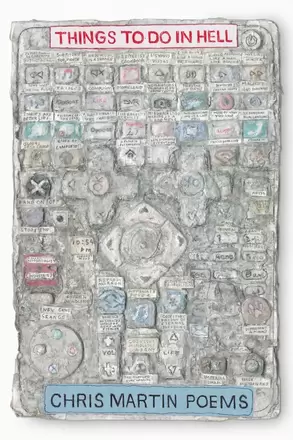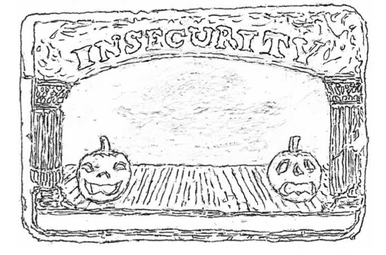In his collection of poems, Things to Do in Hell, Chris Martin depicts the mundane in all its hellish glory. Its title sets a tone for the dichotomy within, seemingly belittling the grandeur of hell. His poetry brings attention to life and death, light and dark, pain and mercy, the quotidian and the grandiose. His poems are accompanied by unsettling drawings of everyday objects. These objects, covered in words, act as a sort of visual poetry, going beyond the standard line-by-line poem. The only way I can describe the aesthetic of this book of poetry is a creative, sometimes calm and untheatrical, display of ennui that attempts to connect earth and hell. What are some things one might do in hell, you may ask? Martin’s titular poem includes mundane and agonizing activities such as, “Grab lunch,” “Try a new flavor of yogurt,” “talk to Steve,” along with “Burn in a lake of fire” (lines 1-8). As you can see, mundanity and agony are side-by-side in his poetry, but mundanity and agony are only two aspects of Martin’s “Tender Hell,” whose relationship to earth is elaborated throughout this collection of unnerving poems and eldritch sketches. This poem also contains monetary motifs, such as, “Polish your silver,” “Sell out the people you used to call friends,” “Exaggerate your earnings,” “Seek employment” (lines 2-21; italics mine). In his rendition of hell, Martin emphasizes greed, perhaps implying that greed is of the gravest of human vices. Throughout the collection, Martin employs the word “cinema” in an unconventional way. For instance, he uses it to describe the “cinema of sleep” in his poem “A Small Human Being Breaks Everything” (line 27). Reading this with the lines, “Tricking pauses into cinema / Time is one fucked-up dude,” it seems that cinema may stand for cognition or even perception itself (lines 85-6). Martin presents this cinema as inescapable in “Yes the Animals": "In my arid philosophy in my blue The narrator is fearful of this “cinema” in a place of treatment as implied by the presence of a nurse. The cinema, as Martin describes it, is something that follows the viewer throughout reality, even in sleep. Understanding the cinema is essential to discussing this work. We are perpetual, involuntary spectators of the cinema, unaware of whether we are watching earth or hell Martin presents some interesting social commentary in addition to his abstract view of perception. The author humbly introduces himself in “Answers,” begging the question: “So of course I wonder This humility accompanies his commentary. In his titular poem, where he mixes the grandiose with the mundane, Martin features grand moments in politics and civil rights: “Exaggerate your earnings In his depiction of hell, Martin uses world events from our cinema, insinuating that we may be living in a “tender hell” as he calls it. This review would not be complete without mentioning Martin’s unsettling sketches. Throughout the collection, he includes renditions of everyday items, like a receipt or a cassette tape. These drawings take a sinister turn, bastardizing the quotidian. In one of his visuals, he uses the social security card layout to create an insecurity card.
Given that the card he mocks is given to the masses, this shows that insecurity is assigned to everyone. Perhaps this card is assigned to citizens of Martin’s tender hell. This would explain the Jack O’ Lanterns’ presence, which originate from the story of Stingy Jack whom Satan gave an ember to light his hollowed turnip. This insecurity card is just one of the many ways that Martin bridges the gap between earth and hell.
0 Comments
Leave a Reply. |
Archives
July 2024
Categories
All
|
|
Glassworks is a publication of Rowan University's Master of Arts in Writing 260 Victoria Street • Glassboro, New Jersey 08028 [email protected] |
All Content on this Site (c) 2024 Glassworks
|



 RSS Feed
RSS Feed
